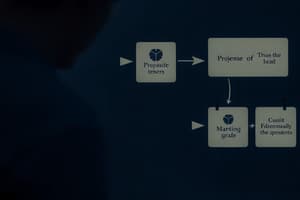Podcast
Questions and Answers
What is the primary focus of the bargaining stage in the grieving process?
What is the primary focus of the bargaining stage in the grieving process?
- Feeling a deep sense of sadness
- Asking for additional time to delay the inevitable (correct)
- Accepting the loss fully
- Expressing anger towards oneself
Which of the following is NOT a common response in the depression stage of grief?
Which of the following is NOT a common response in the depression stage of grief?
- Increased social interaction (correct)
- Decreased sleep
- Decreased appetite
- Sadness
What does the acceptance stage signify in the grieving process?
What does the acceptance stage signify in the grieving process?
- Acknowledging the reality and moving on (correct)
- Denial of the reality of the loss
- Continued bargaining with fate
- The individual is okay with the loss
Which factor is least likely to affect the intensity and length of grieving?
Which factor is least likely to affect the intensity and length of grieving?
How can one best support a grieving person?
How can one best support a grieving person?
Which statement about anger in grief is true?
Which statement about anger in grief is true?
What emotional state is generally associated with the depression stage of grief?
What emotional state is generally associated with the depression stage of grief?
What is a common misconception about the acceptance stage of grief?
What is a common misconception about the acceptance stage of grief?
Which of the following actions is recommended to help someone in grief?
Which of the following actions is recommended to help someone in grief?
What role does group discussion play in the grieving process?
What role does group discussion play in the grieving process?
Which of the following types of loss is specifically known to be experienced before the actual loss occurs?
Which of the following types of loss is specifically known to be experienced before the actual loss occurs?
What is a common emotional reaction associated with grief?
What is a common emotional reaction associated with grief?
In the grieving process, what stage follows anger according to Dr. Elisabeth Kübler-Ross?
In the grieving process, what stage follows anger according to Dr. Elisabeth Kübler-Ross?
Which of the following best defines perceived loss?
Which of the following best defines perceived loss?
What is a physical reaction that may occur during the grieving process?
What is a physical reaction that may occur during the grieving process?
What feeling might one experience when faced with the loss and denial stage?
What feeling might one experience when faced with the loss and denial stage?
What might be a reason for the feelings of anger during the grieving process?
What might be a reason for the feelings of anger during the grieving process?
Which option describes a situation that can lead to grief?
Which option describes a situation that can lead to grief?
In the grieving process, which stage is often characterized by profound sadness and hopelessness?
In the grieving process, which stage is often characterized by profound sadness and hopelessness?
What physical symptom is least likely to be associated with grief?
What physical symptom is least likely to be associated with grief?
Flashcards are hidden until you start studying
Study Notes
Grief and Grieving Process
- Grief is a subjective emotional response to loss, while grieving (or bereavement) is the process of experiencing that grief.
- Loss can be categorized as:
- Actual loss: Recognized by others, occurring due to anticipated or real situations.
- Perceived loss: Felt by an individual but unverified by others.
- Anticipatory loss: Experienced before the actual loss occurs.
Sources and Types of Loss
- Loss can arise from:
- Change in self-perception or physical aspect (e.g., losing a body part).
- Loss of external objects or resources (e.g., financial loss).
- Separation from familiar environments (e.g., moving houses).
- Loss of loved or valued individuals (e.g., death of family or friends).
Common Losses Causing Grief
- Death of a partner, family member, or friend.
- Personal injury or illness impacting life quality.
- Loss of home environment or lifestyle stability.
- Loss of privacy and sense of independence.
- Loss due to circumstances like relationship endings or financial instability.
Common Reactions to Grief
-
Physical Reactions:
- Heart palpitations, tight throat, sweating.
- Dizziness, shortness of breath, appetite loss.
- Sleep disturbances and difficulties concentrating.
-
Emotional Reactions:
- Feelings of guilt and irritability.
- Anger towards others, deceased individuals, or oneself.
- Loneliness, emptiness, withdrawal from social life.
- Intense sadness and questioning of life's meaning.
5 Stages of Grief (Kübler-Ross Model)
- Denial: Shock and disbelief in the face of loss; difficulty accepting reality.
- Anger: Facing the reality prompts questions like “Why?” and “How?”; anger may be directed towards various entities including oneself.
- Bargaining: Engaging in “What If” scenarios, hoping to change the outcome through promises or actions; often provides temporary relief from reality.
- Depression: Reality and sadness set in deeply, characterized by a profound sense of loss; normalizes feelings of sadness and encourages taking the time needed to heal.
- Acceptance: Acknowledging the reality of loss without the expectation of change; signifies the beginning of moving on.
Factors Influencing Grief
- Relationship dynamics with the deceased.
- Circumstances surrounding the death (sudden vs. expected).
- Personal life experiences that shape individual reactions to loss.
Supporting Others Through Grief
- Communicate genuine concern and be present for the grieving individual.
- Recognize the complexities of grief; easy answers may not be available.
- Practice patience and provide unwavering support without judgment on emotional expressions.
Studying That Suits You
Use AI to generate personalized quizzes and flashcards to suit your learning preferences.




